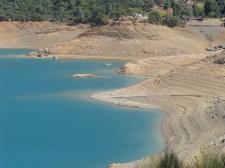 Taking to the airwaves in response to current unprecedented drought conditions, the Metropolitan Water District will begin broadcasting a series of radio ads calling for Southern Californians to continue conserving water.
Taking to the airwaves in response to current unprecedented drought conditions, the Metropolitan Water District will begin broadcasting a series of radio ads calling for Southern Californians to continue conserving water.
Starting 4/1, Metropolitan will deliver water-saving messages in 10- and 15-second radio traffic sponsorships on nearly 60 radio stations in English, Spanish and Mandarin Chinese throughout the Southland through 5/18.
“These traffic reports build on our existing conservation messages to reinforce just how serious the state’s water challenge is,” said Metropolitan General Manager Jeffrey Kightlinger. “Southern Californians have done a great job incorporating conservation into their daily lives. However, these extraordinary times call for extraordinary water-saving efforts. Although we don’t plan to enforce mandatory restrictions this year, any saved water can be kept in our reserve accounts to possibly stave off the need to allocate supplies in coming years.”
The ad launch comes less than three weeks after Metropolitan’s Board of Directors authorized up to $5.5 million for a regional communications, outreach and advertising campaign aimed at promoting greater water awareness and encouraging additional conservation.
Dee Zinke, Metropolitan’s deputy GM for external affairs, said the multipronged, multimedia campaign will focus on the value of water, the need to conserve and the importance of investing now in water-use efficiency to prepare for the future.
The traffic sponsorships, which will precede regular reports, carry a simple, serious message, calling out the many ways consumers can pitch in and start saving water immediately.
The Metropolitan Water District of Southern California is a cooperative of 26 cities and water agencies serving nearly 19 million people in six counties. The district imports water from the Colorado River and Northern California (Shasta Lake, pictured) to supplement local supplies, and helps its members to develop increased water conservation, recycling, storage and other resource-management programs.
RBR-TVBR observation: A man-made drought? Here’s some info from The Committee on Natural Resources, United States House of Representatives: “California’s water storage and transportation system designed by federal and state governments includes 1,200 miles of canals and nearly 50 reservoirs that provide water to about 22 million people and irrigate about four million acres of land throughout the state. In May 2007, a Federal District Court Judge ruled that increased amounts of water had to be re-allocated towards protecting the Delta smelt – a three-inch fish on the Endangered Species List. Because of this ruling, in 2009 and 2010 more than 300 billion gallons (or 1 million acre-feet) of water were diverted away from farmers in the Central Valley and into the San Francisco Bay – eventually going out into the Pacific Ocean.
This man-made drought cost thousands of farm workers their jobs, inflicted up to 40 percent unemployment in certain communities, and fallowed hundreds of thousands of acres of fertile farmland.
Unemployment remains at a regional average of 17%. With current precipitation at near-record lows, the same regulations will be imposed pushing unemployment even higher.
The Pelosi-led Congress did nothing to reverse the plight of the San Joaquin Valley and even obstructed repeated Republican actions to reverse the situation. The Sacramento-San Joaquin Valley Water Reliability Act reflects Republican promises to avoid another man-made drought.
H.R. 3964, The Sacramento-San Joaquin Valley Water Reliability Act:
H.R. 3964 is a comprehensive solution that would restore some water deliveries, ensure a reliable water supply for people and fish, and save taxpayer money by ending unnecessary and dubious government projects.
Last Congress, the House passed bipartisan legislation, The Sacramento-San Joaquin Valley Water Reliability Act, to restore the flow of water. The Democratic-controlled Senate did not act on that bill or any California water legislation. The situation in California is now dire because of inaction by the Senate.”





